I can’t even count how many times I’ve rewritten this introduction, so I’m throwing in the towel. I’m not a good writer and every attempt at sounding smart makes me cringe. I’m just going to write in the same manner in which I speak.
Anyway, I was talking to my buddy and fellow cartoonist Brandon Lehmann the other day about this topic. He offered to help but asked, “What is the article about again?” I laughed out loud and said “comics and mental health lol.” I thought it was ironic that I would be writing about this, seeing as how I’m hardly the poster child for well-adjusted cartoonists.
After our discussion, however, I realized that there was more common ground on this topic than I’d initially thought. It dawned on me that I felt like I sounded pretentious writing this introduction because, while I was explaining my personal relationship with comics, it really wasn’t about me. An interesting thing he said was “One of my standard jokes is that the drive to be a cartoonist is a very specific type of mental illness. Kind of being like a drug addict.”
I can see the parallels with the love-hate relationship that most of us have in making comics. And while this self-flagellation is something we share, our woes aren’t necessarily the same. We have different ideas of what constitutes success in comics: critical recognition, financial stability, validation from strangers, approval from peers, accolades, getting deals from specific publishers, getting published by certain publications, praise for art, praise for writing, being funny, being cathartic…it’s an endless array of wants.
There IS one thing he mentioned that I believe applies to us all, however, and it is that being artists makes us vulnerable because we spend all this time in our own headspace, making something extremely personal then putting it out there for all to see. And comics exacerbates this because they take up more time than any other art medium that I can think of.
So here’s my disclaimer: My intention here is to share tips for people who are mentally burned out from making comics but do not want to quit doing it. These are things that I’ve stumbled upon and have tried or intend to try in my own effort to navigate ways to cultivate a healthy balance between comics and self-care. They may or may not help you, but there’s no harm in trying different things, right?
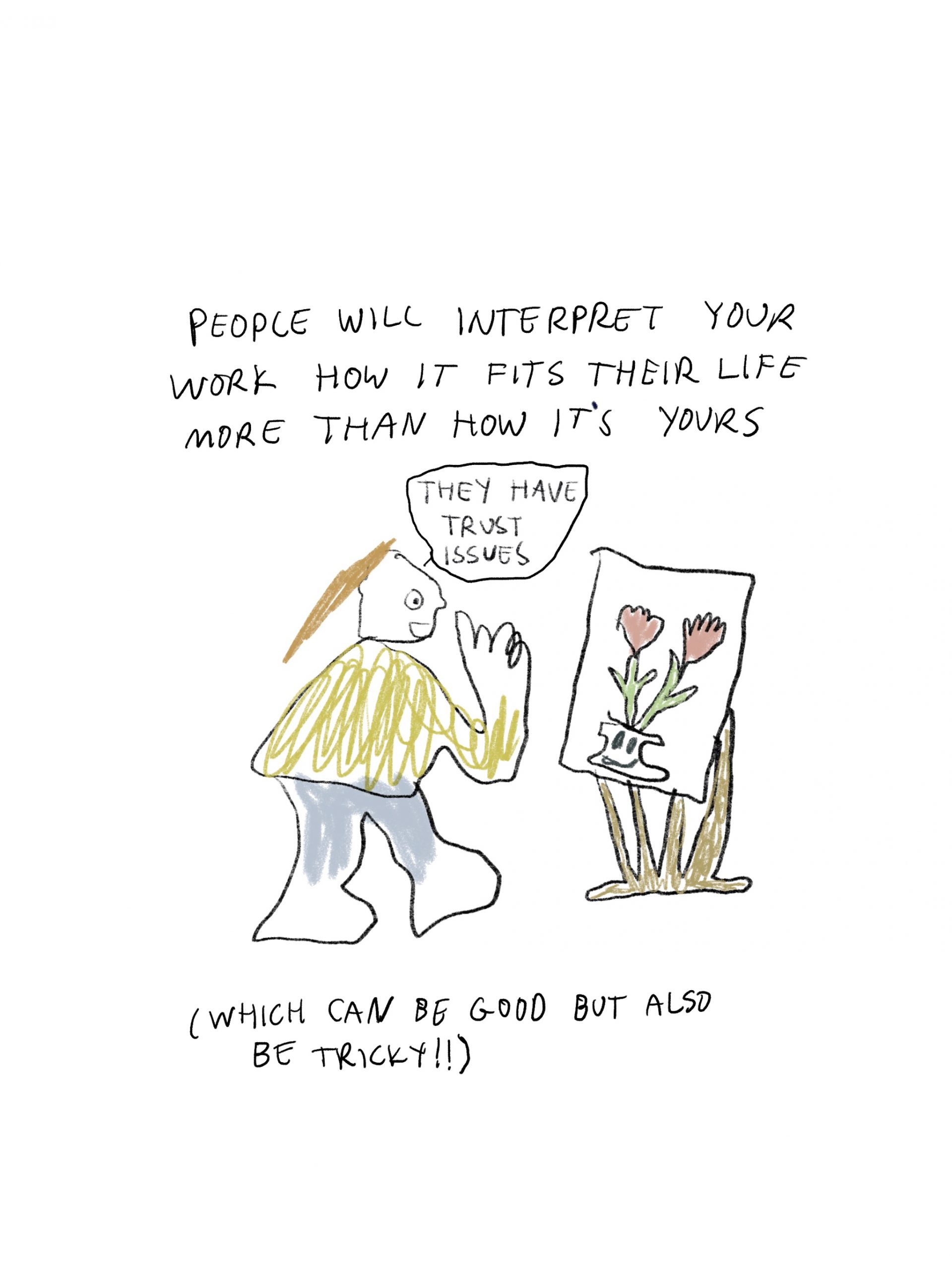
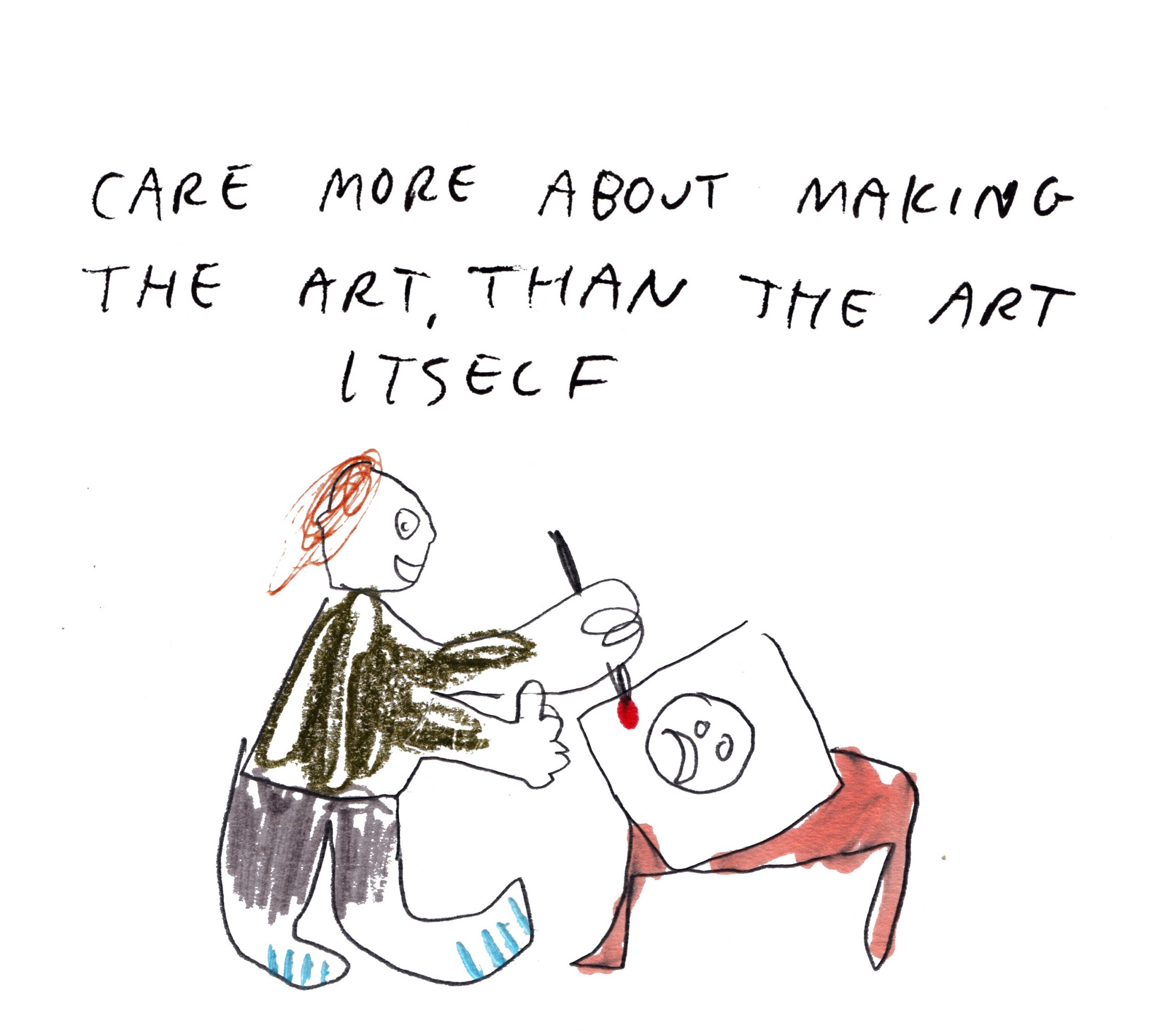

Here are suggestions for different mental gymnastics that we may be going through together.
“I can’t draw anything until I think of a project good enough to post/publish/pitch/submit….”
Remember when the act of creating art was a reward in itself? When I’m paralyzed in front of a blank piece of paper, I have to remind myself that there doesn’t have to be a point. We tend to pigeonhole ourselves when we resort to a “formula” that has worked for us in the past (for publications, followers, commissions, clients, etc).
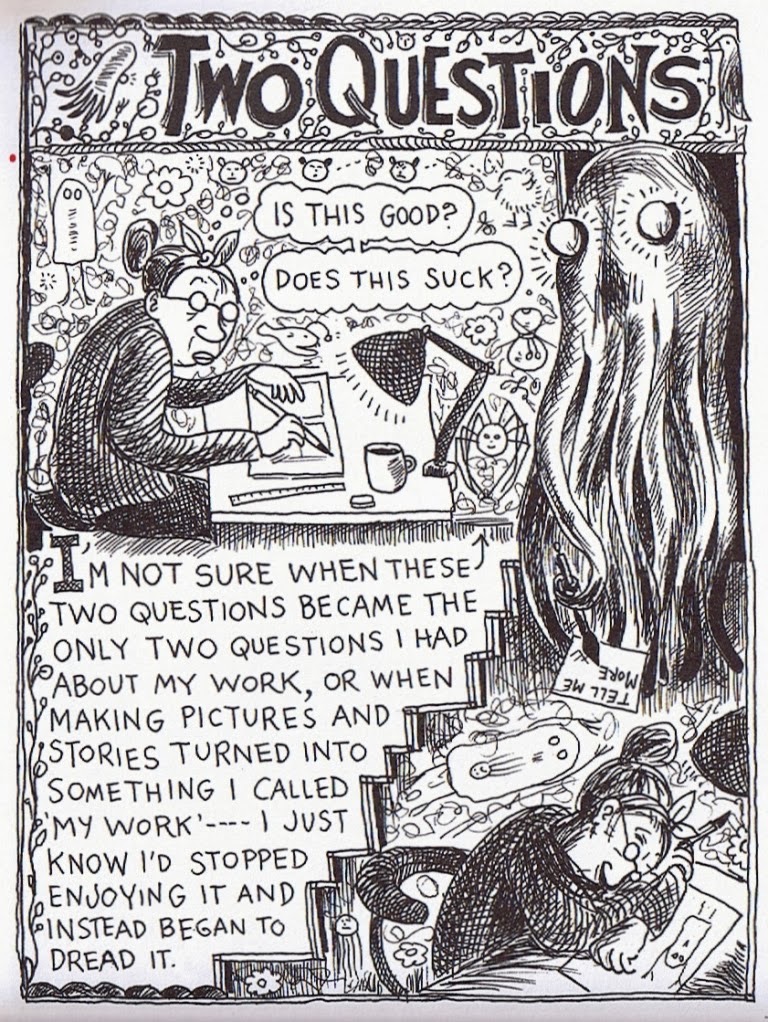
Also remember that we don’t have to “finish” anything and that others seeing what we create has no bearing on its existence, validity, or importance.
Here are some suggestions that may help you to get unstuck:
- Doodle on random pieces of paper.
Tear out a page from your sketchbook if you need to. You can always paste your doodle back in. Sometimes it helps to remove the pressure of having to face a nice, crisp, blank page. So clean, so pure…must not sully it with your ugly marks…
- Use an existing book as a sketchbook.
This is based on a cheezy Dada assignment I did for design school but I found it incredibly fun. You basically take a shitty paperback and deconstruct/deface each page. I like to completely paint over the pages with a base, leaving out some words or phrases to create pretentious poetry. Then I add drawings or collage, whatever.
Working around existing marks solves the problem of the intimidating blank page while forcing your brain to creatively problem solve in new ways. It’s also a great way to disguise the embarrassing literature you’ve accumulated AND it helps the environment. Win-win. - Use drawing prompts.
Lynda Barry has a ton—if you don’t have access to her books, just Google her. Many of her exercises, worksheets, journaling prompts, etc. are online and she has a Youtube channel.
I also like Ivan Brunetti’s drawing prompts. You can find some of these online too if you don’t have his book. - Copy something.
I ripped this from Lynda Barry but am giving it a special mention in case it even hurts to THINK about what to draw. I don’t mean sketching from life or from references but copying work from artists you admire. Kind of like how we drew existing cartoon characters as kids. If this isn’t your jam, copy whatever you like.
When I’m feeling extra ornery and can’t even look at art, I like to copy plants or animals from nature books. Try to use real books and not the internet. I like the LIFE series—it’s an ancient set that I rescued from my mom’s house. I used to look at the insects book as a child specifically to ogle the macro shots of bugs in disgust.
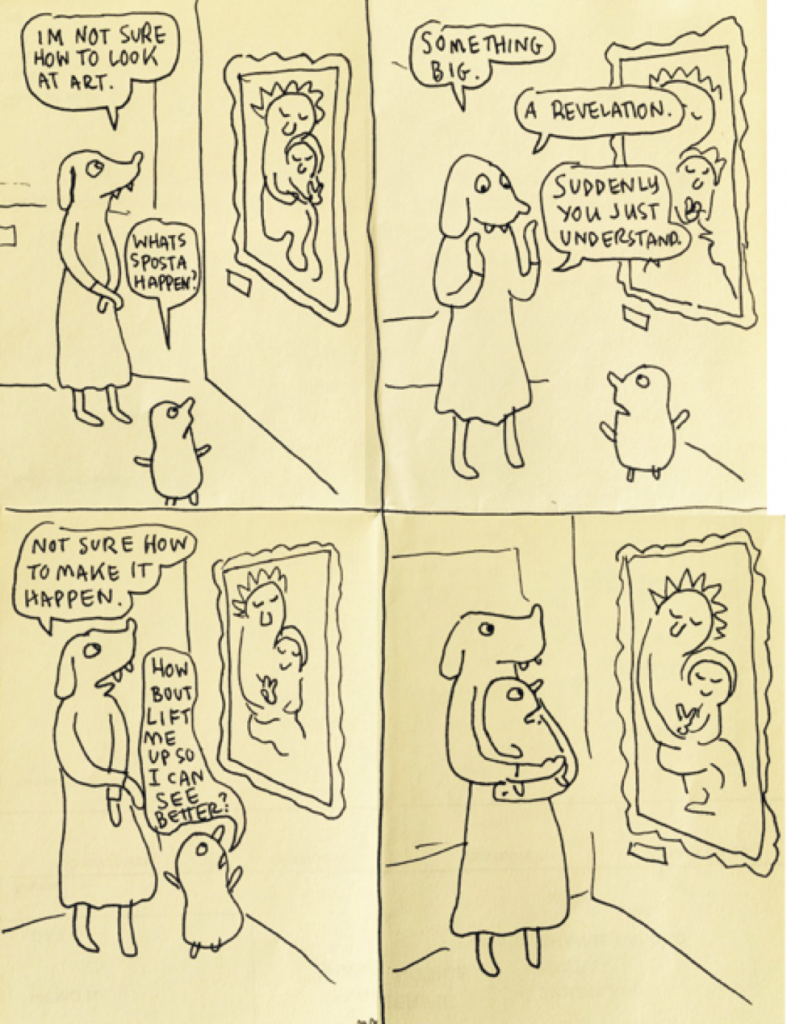
- Use materials that are outside of your comfort zone.
Even better if it’s something you’ve never tried. It helps to not be an expert at something as it relieves pressure to “perform”. They don’t even have to be art materials. Experiment without consequence like the first time you did acid!
“I need to take a creative shit but I’m just too tired.”
I’m neurotic about being productive but only in a creative sense, which is what earned me the title of being The Underachiever of my family. Sometimes, though, I overdo it to the point that I just have no energy left, yet it depresses me not to accomplish anything.
One lesson I gleaned from one of Jon Michael Frank’s workshops (I’m paraphrasing here) is that anything creative (or whatever feeds your soul) that you engage in will improve your art. So yes, you are being productive.
For these moments, here are some non-committal activities I engage in that may help you scratch that creative itch:
- Scroll through the feed of an artist you admire and go down the rabbit hole.
If you’re on your phone anyway, this is a great way to “do nothing” while discovering art you like from people you’ve never heard of across the global gamut. It doesn’t have to be comics or visual art, even. There are times I’ve gone down a music rabbithole and still ended up on the page of a cartoonist I’d never heard of, who’s done the band’s posters or animated their videos, etc. I guarantee that you’ll find something that creatively inspires you because it’s still your taste—music, film, art…they are all interconnected.
It’s easy to get sidetracked or distracted on your phone so it helps to have a no “junk food” rule for 5 minutes or however long you need. Set a timer if you have to. - Learn something.
If a book is too much for you right now, then read an article on your phone (see no “junk food” rule above) or listen to a podcast or watch an instructional video—anything that will help you evolve and be a better human than you were 5 minutes ago. It doesn’t have to be life-changing.
- Explore other disciplines.
I was cleaning out my office and found some old books that I used to turn to for design inspiration when I still had some semblance of a career as a graphic designer. They aren’t even books about design—one is the beautifully collaged journal pages of Dan Eldon, the other, a collection of sketchbook pages from creatives of varying occupations.
Whatever floats your boat—be it movies, tunes, crafts, typography, horticulture, whatever—immerse yourself in it, if even passively. Anything that inspires you and brings you joy will manifest in your work when you are ready to go back to making comics.
“I want to quit social media but I can’t because that’s how I promote my comics and it’s also making me hate comics.”
Ah, the never-ending social media conundrum. The key to freeing yourself is to rewire your brain to create art without an audience in mind. I still struggle with this but here are some activities that may help:
- Have a dedicated sketchbook for your eyes only.
If this is too challenging, start by doodling in your journal or wherever it is that you write things you don’t want others to read.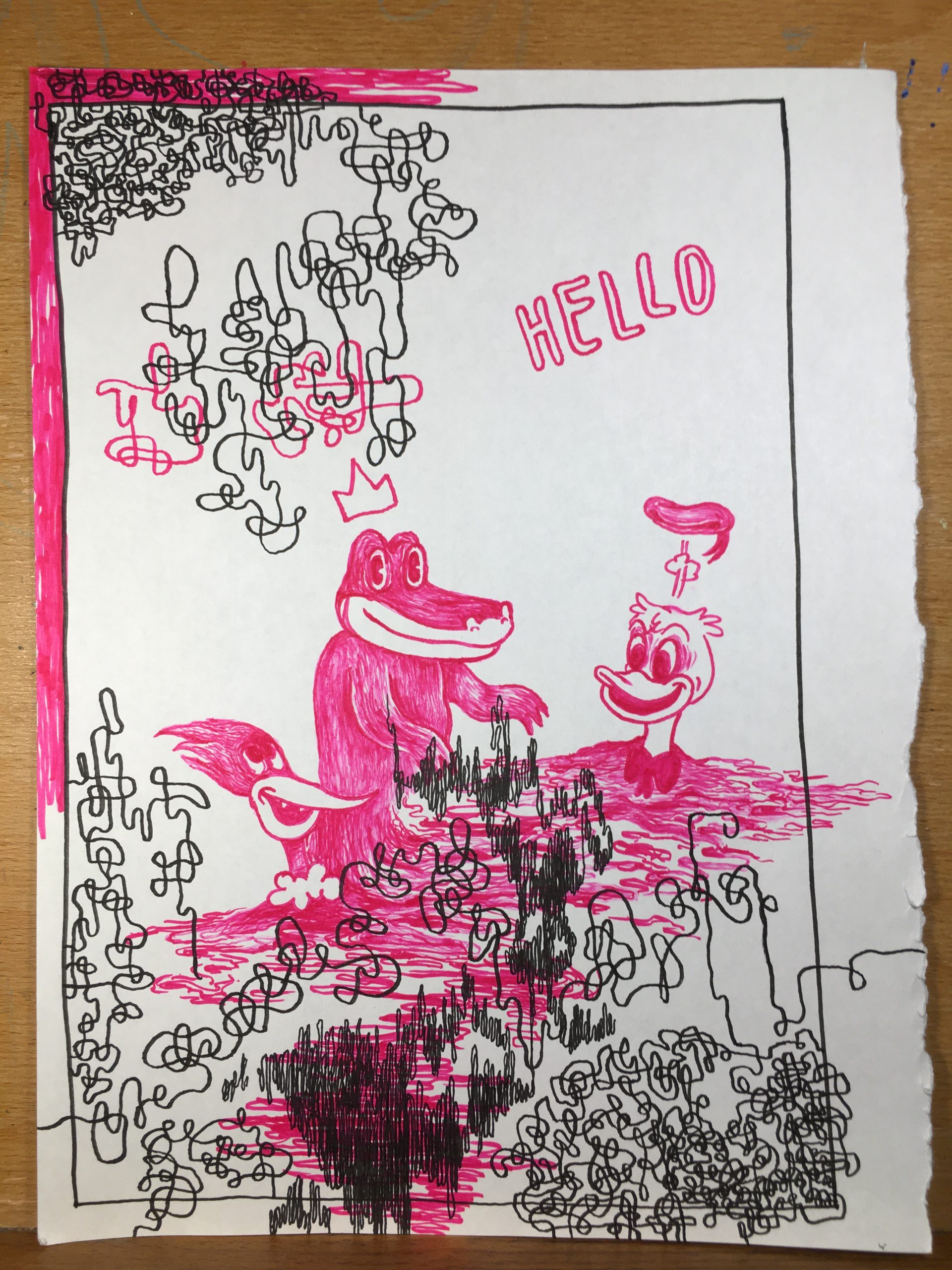
- Repurpose your relationship with social media into something mentally beneficial.
If you use your personal account to promote your work, post what you need to then walk away immediately. Curb the urge to constantly check for “likes”—set downtime on your phone, mute, distract, whatever it takes. You can reply to comments at a later time.
Bookmark, set alerts, or create a custom feed for social media accounts that you feel contribute to your mental health. Interact with these instead of scrolling mindlessly through accounts you find toxic.
I recommend Nichole J. Georges, Jon Michael Frank, and Tara Booth for mental health or recovery stuff. It could be anything that you feel lifts your spirits…music has always helped me wade through many dark moments and I find strength following certain bands that align with my ideal mental state.
“I really, really, fucking really don’t feel like being productive today.”
1. Don’t be productive today.
It’s okay to take the day off. If it feels like a burden then it becomes a job. There’s nothing wrong with art being your day job but it’s important to find something else if you feel resentment doing it.
This is the point where you throw the “junk food” rule out the window. Give your brain a free pass and play your video games, watch your crappy shows—whatever you feel like doing, even if what you feel like doing is absolutely nothing.
Part of the problem with comics culture today is that we are all taking it waaaaay too seriously. It’s a slippery slope since cartoonists want to be taken seriously. Comics take an incredible amount of time and effort to make, and the rewards are rarely ever commensurate with the amount of work that’s put into them. While there’s nothing wrong with elevating them as an art form, it becomes detrimental when cartoonists are punished for making good ol’ fashioned funnies. Lighten up!
Social media and toxic “scenes” have also contributed to a bunch of talented cartoonists throwing in the towel because they’re too broke, tired, old, mentally ill, or all of the above.
What I’m getting at is this: You are not your art. Nobody but you yourself spends so much time thinking about you or your accomplishments (thanks again, Brandon!). Keep this in mind, reconnect with creative work that gives you joy, and maybe… hopefully… things will turn out okay.
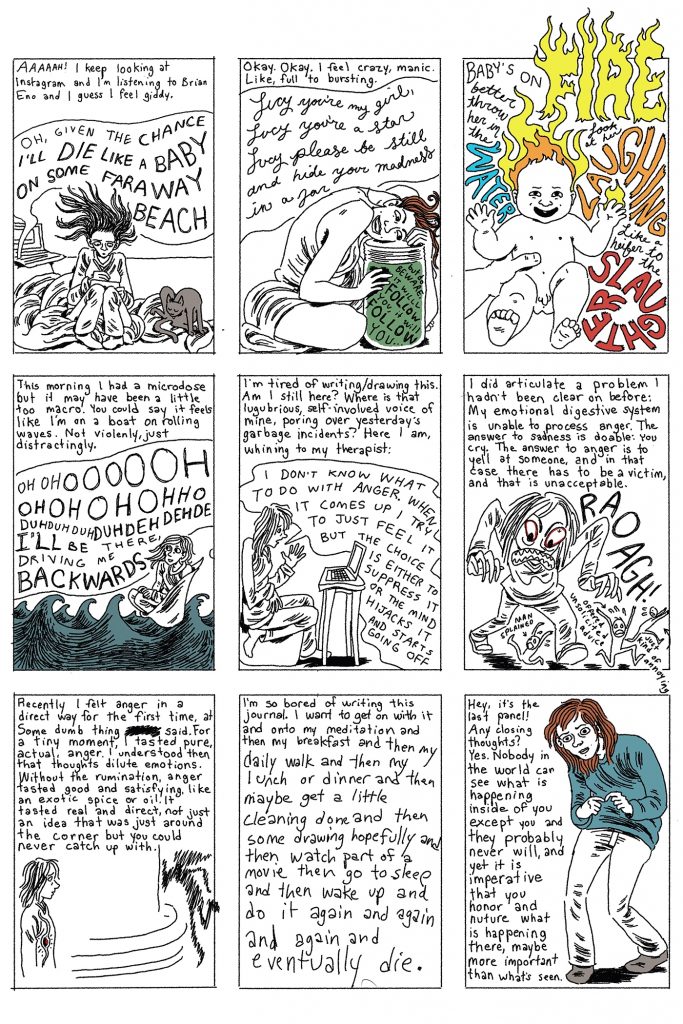
Additional Recommendations from November:
WORKSHOPS
Jon Michael Frank (@jonmichaelfrank)
– Making the Personal Relatable
https://www.dropbox.com/s/oxfrzd8c3eiyjf4/zoom_0.mp4?dl=0
– Vulnerability Without Ruining Your Life (sort of)
https://www.dropbox.com/s/az5vvv5g58d2q9s/Jon-michael%20-%2026.02.2021.mp4?dl=0
Lynda Barry (@thenearsightedmonkey)
– Graphic Medicine Drawing Together
https://youtu.be/w1Z9uH_MufI
– Lynda’s YouTube Channel
https://www.youtube.com/channel/UCUgBd6QTM8Qm6Kv9cTulonQ
Nichole J. Georges (@nicolejgeorges)
– Grounding Exercises
https://www.instagram.com/nicolejgeorges/channel/
PODCASTS
– Gabrielle Bell / Tom Kaczinsky (Uncivilized Territories)
Cartoonists Tom Kaczynski and Gabrielle Bell discuss comics, philosophy, literature, esoterica, and Gabrielle’s personal life.
https://podcasts.apple.com/us/podcast/uncivilized-territories/id1563329108
BOOKS
Fun esoteric stuff
Anders Nielsen
– Big Questions
John Porcellino
– King-Cat
Lynda Barry
Comics:
– One! Hundred! Demons!
– The Greatest of Marly’s
– My Perfect Life
– The Freddie Stories
Fiction:
– Cruddy
– The Good Times Are Killing Me
Instructional Stuff
Ivan Brunetti
– Cartooning: Philosophy and Practice
Lynda Barry
– Making Comics
– What It Is
– Picture This
– Syllabus
Inspiration mentioned in this article
– The Journey is the Destination: The Journals of Dan Eldon
– Sketchbooks: The Hidden Art of Designers, Illustrators and Creatives
SOLRAD is made possible by the generous donations of readers like you. Support our Patreon campaign, or make a tax-deductible donation to our publisher, Fieldmouse Press, today.
SOLRAD is made possible by the generous donations of readers like you. Support our Patreon campaign, or make a tax-deductible donation to our publisher, Fieldmouse Press, today.

Leave a Reply